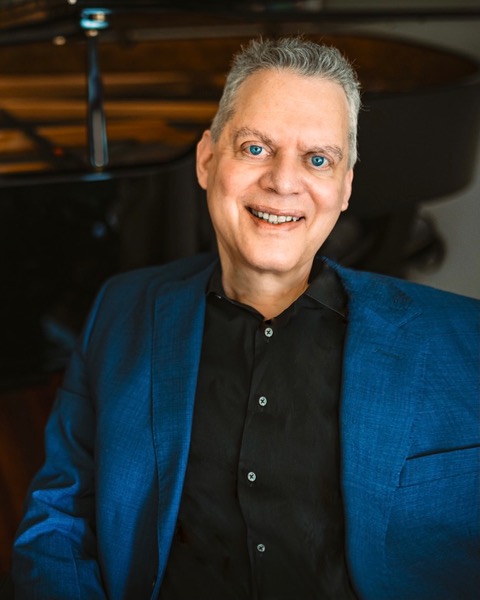When you have a one-week rehearsal period for a complicated program, you have to work quickly. Of course I want to be a gentle, enlightening guru-figure for the four singers I’ve invited. I also want to get every song up and running ASAP. I am happy to say that a lot of our work is getting done simply by my playing the pieces the way I think they go, and inviting the singers to come along for the ride. I have 20 or 30 years’ experience with a lot of the program—goodness, 40 years in a few cases—and while the piano in Poquatuck Hall is not, shall we say, an instrument of great beauty or responsiveness, I can often achieve liftoff just by getting the rhythms—the tempi—–the articulation—the pauses—the colors—the dynamics of the song into the room. In many cases that’s enough to accomplish 90% of the work.
But sometimes you need to go into the weeds. The cast learned their material on their own and naturally they acquired some habits by the time of our first rehearsal. But when a style is unfamiliar, many singers postpone any interpretive work until they work with me. They keep it neutral, getting the basic notes and rhythms into their system, working on the text, and doing some background research to locate the song’s cultural context. But the final act of ownership can go on hold until they have some idea of what I want, and it’s not always easy moving out of Safe Mode. I often send recordings of past performances if a piece is really rare, and everyone always says they are grateful to hear them. But often the element I most wanted them to absorb from the recording eludes them, usually the rhythmic flow—and in any case it’s considered a bit déclassé to learn music from recordings. Only lazy singers—or the ones who can’t read music—use CDs instead of scores. Or so it is said.
Elaine, Olivia, Thomas, and Jesse have vaulted themselves brilliantly into most of the songs. Today Elaine and I broke into Paul McCartney’s “Back in the USSR” and managed to create an intimate piano-and-voice version that is going to do the trick. Thomas found the swagger and sarcasm of his Afro-Cuban tango—he took my breath away. Where did he learn to be a smart-ass Cuban? Jesse spun out the long lines of the “Sadko” aria as if he’d been singing it his whole life. And Olivia swung into her French operetta number like a top-of-the-line chanteuse.
But there were some moments that were less airborne. Elaine can sail through the vocal intricacies of Bizet’s “Adieux de l’hôtesse arabe” with no difficulties, but her French diction was problematic. I avoid the role of “vowel-bitch” like the plague because it makes me feel inflexible and dogmatic. It brings out my inner Henry Higgins, a role that does not suit me. Still, the word is “pays,” pronounced “pay-ee,” not “pah-yee.” We got to the double-bar and I said sweetly to Elaine, “Let’s sit down over tea at the break, and go over the poem together, shall we?” Summoning my inner Yoda (“Fear leads to anger, anger leads to hate”), we began. She recited, “Puisque rien ne t’arrate…” “No, not ‘ar-rat.’ ‘Ar-RET.” “Ar-rat.” “Ar-RET! Eh, like, um, EGG.” “Puisque rien ne t’ar….rat….” Elaine finally heard it. “OK! OK. ‘Puisque rien ne t’ar-EGG. Tar-egg. Tar-egg.” Pause. “Tar-RET.” “Bingo.”“The rain in Spain….I think she’s got it,” I sang to myself.
This continued for a while—the Victor Hugo poem is quite long. We had close encounters with the word “soeurs” (“No, not ‘sars,’ ‘soeurs!’” I snarled) and “sein” (“Not ‘sang,’ ‘sein!’”) But soon an interesting thing happened. As Elaine kept reading, her French improved—so much so that by the end she was speaking like a native. “Elaine, you almost sound as if you’re fluent in French!” “Oh, I am. Well, kind of. I learned it very young. I did an immersion thing at my school when I was in first grade.” “How many more years did you take French?” “Oh, a little while longer.” “How much longer?” “Like till I was in twelfth grade.”
I was stunned. This didn’t make any sense. She was schizofrankic.
She explained. “I was told by a voice teacher that my vowels were too closed, too tight—that I needed to open them.” I refrained from asking who the culprit was, I was too stunned by all of this. “So I got in the habit of singing French with more width in the vowels.” “Well, we got to iris everything back in. ‘Sang’ means blood, ‘sein’ means breast, you can’t get that stuff confused….”
I realized I needed to back off. Elaine is a tough cookie but every cookie crumbles at some point. She was starting to fray and I realized just in time that it was time to get her off the hot-seat.
The trick with coaching is to get the singers to do what you want them to do, and to do it with love. The trap of coaching is that they will often do exactly what you tell them to do and do it stiffly, without love. The love of music is truly at the root of it all, even the gnarliest, most elusive phrases. I’m still working on it.

Pictured: Elaine releases her soul into the room, to my pleasure.


0 Comments